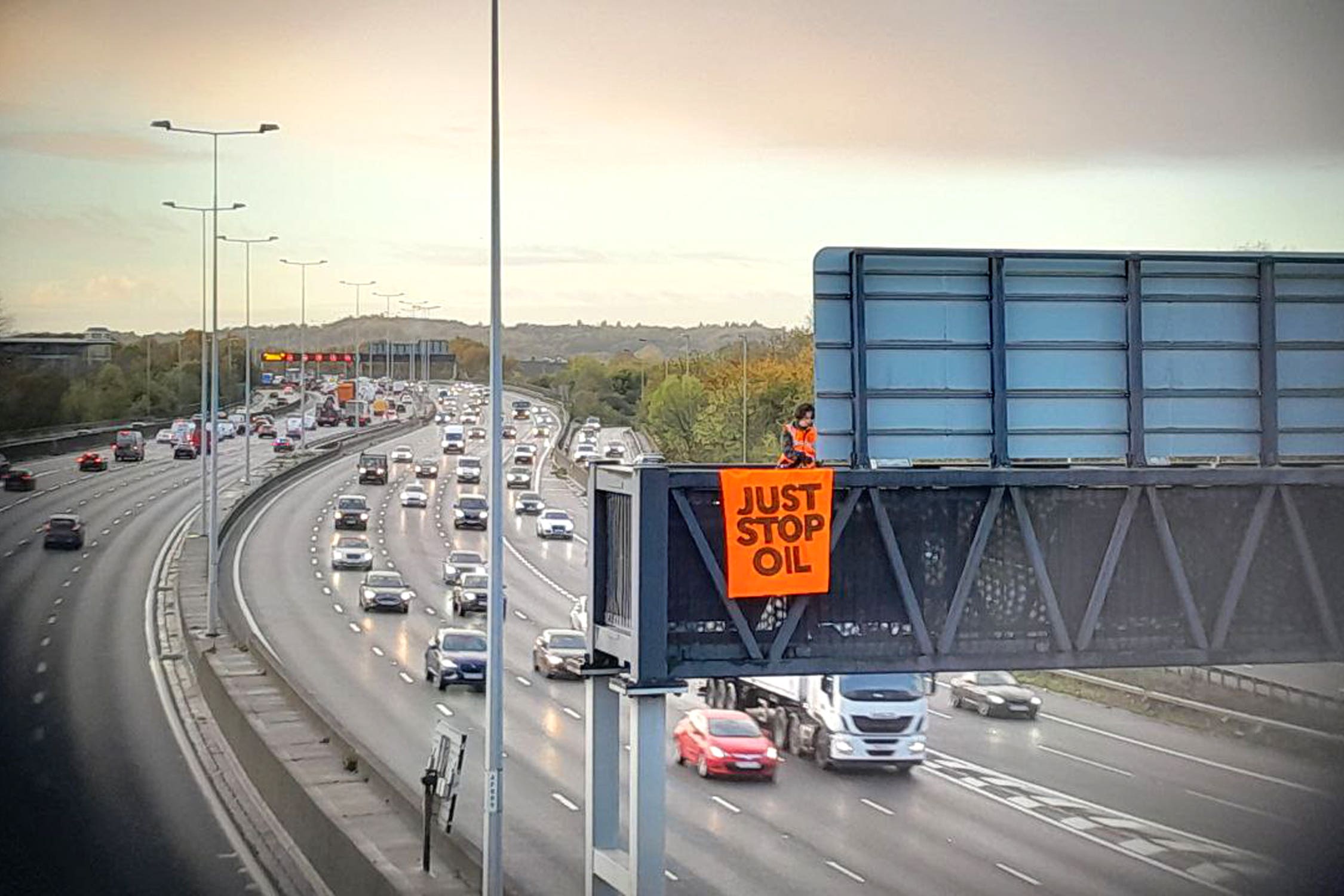Hertfordshire Police admit arresting journalist at oil protest was unnecessary
An LBC reporter had been reporting on Just Stop Oil activists on the M25 on Tuesday when she was questioned and handcuffed by officers.

A police force has admitted the arrest of a journalist who was handcuffed and held in custody for five hours after covering an environmental protest was unnecessary.
Charlotte Lynch, of LBC, told of her “terrifying” five hours in a police cell, a day after documentary maker Rich Felgate and photographer Tom Bowles were arrested for reporting on the activists on the M25 in Hertfordshire.
Hertfordshire Police, in a statement released on Wednesday evening, acknowledged that while the actions of its officers at the scene were “understandable”, the arrest “would not have been necessary”.
Prime Minister Rishi Sunak has joined police chiefs in calling for press freedom after multiple arrests of journalists during the Just Stop Oil protests this week.
Mr Sunak said it is “vital” that journalists are able to do their job freely, “without restriction”, as the chief constable of Hertfordshire Police called for a review into the arrests.
The Prime Minister’s official spokesman told reporters: “I am cautious about commenting on specific incidents. Operational decisions are a matter for the police but the Prime Minister strongly believes in championing press freedoms.
“We wouldn’t want to see those freedoms impeded while journalists are going about their day-to-day business.”
Ms Lynch had been reporting on the activists from a road bridge over junction 21 of the M25 on Tuesday for about 45 minutes when she was approached and questioned by two officers.
There’s an enormous amount of pressure in play around those protest issues for the reasons that you would understand
After showing them a press card and having explained she was reporting on the demonstration, the officers handcuffed her, took her phone and arrested her on conspiracy to commit a public nuisance.
They wanted to know how Ms Lynch knew about the protest, she said.
She said: “It was absolutely terrifying being in a cell with a pad for a bed in one corner and a metal toilet in the other.
“I was just doing my job. What’s also terrifying is what this means for press freedom. It was blindingly obvious I was a reporter.”
Hertfordshire Police said the circumstances of the arrest of the LBC journalist have been internally reviewed.
The force concluded: “Though the actions of the officers at the scene are understandable, in retrospect an arrest would not have been necessary.”
Documentary maker Mr Felgate and photographer Mr Bowles had been capturing footage and pictures of activists on a footbridge over the M25 near Kings Langley, at close to 11am on Monday when they were handcuffed.
The pair, both of whom say they have no affiliation with the group, had their equipment seized and were taken to a police station, despite efforts to show their press cards.
The protests are a source of legitimate public interest and journalists, filmmakers and photographers have a right to attend protests and report on behalf of the public
Mr Bowles, 47, from Hackney, east London, told the PA news agency he was held until 1.30am, hours after his wife and 14-year-old daughter were woken up as three officers searched their home.
Speaking to journalists at a conference in Westminster on Wednesday, the chairman of the National Police Chiefs’ Council, Martin Hewitt, said officers are under pressure when dealing with protesters but media should not be prevented from reporting on them.
He said: “There’s an enormous amount of pressure in play around those protest issues for the reasons that you would understand.
“But, of course, there is a right for journalists to go and report on those occasions and that shouldn’t be prevented in any way.”
Metropolitan Police Commissioner Sir Mark Rowley said: “Press freedom is really important and you will often want to be – and quite rightly be – quite close to where difficult things are happening so you can report it well and I absolutely, absolutely support that.
“The principle that you’re going to be close to the action sometimes, and we should be sensitive to press freedom, of course, I completely agree with.”
Home Secretary Suella Braverman later said the reports she had heard were “concerning”, but added that any investigation into what happened should be allowed “to run its course” without pre-judgment.
It came after Liberal Democrat MP Daisy Cooper asked the Commons deputy speaker Nigel Evans how the House could summon Ms Braverman to explain and apologise for the treatment of journalists covering protests given the “severity of the incidents”.
Ms Cooper, the MP for St Albans, added: “We are not an authoritarian state. The ability of journalists to do their job unhindered is a vital part of our democracy.”
Hertfordshire Police said officers had been “using their professional judgment” to clear possible protesters from the roads.
A statement from the force said additional measures are now in place to ensure that legitimate media can do their job, with officers instructed to ensure they conduct “full and thorough checks” before making an arrest decision, and get final approval by a supervisor.
The force said: “In addition, Mr (Chief Constable Charlie) Hall is requesting an independent force to examine our approach to these arrests and to identify any learning we should take in managing these challenging situations.”
Dawn Alford, executive director of the Society of Editors, said they are “deeply concerned” by the arrests, adding that journalists, filmmakers and photographers “have a right to attend protests and report on behalf of the public”.
Former shadow attorney general, Baroness Shami Chakrabarti, told LBC the situation is “very, very serious” accusing the police of “effectively shutting down the free press, the free media, in this country”.
Education Secretary Gillian Keegan also said: “Journalists shouldn’t get arrested for doing their job.”